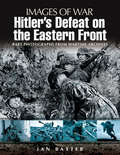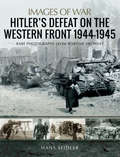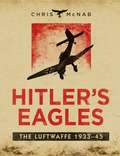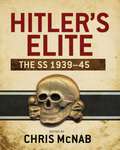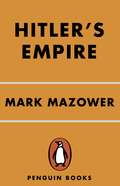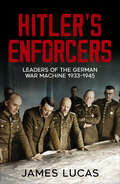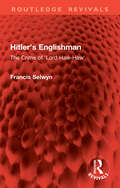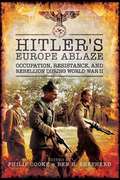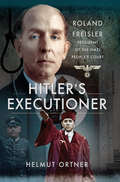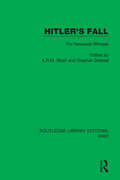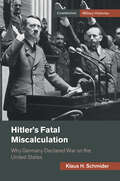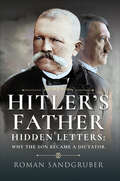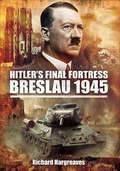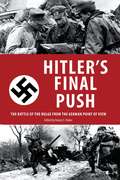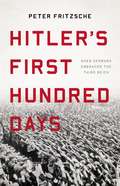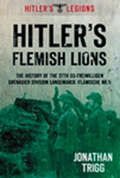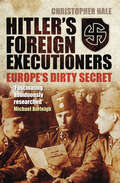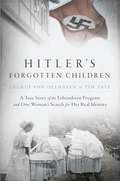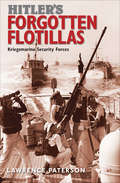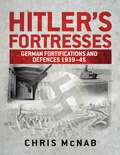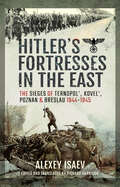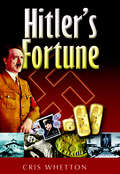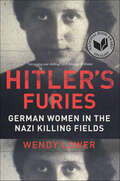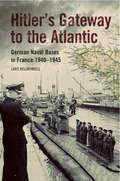- Table View
- List View
Hitler's Defeat on the Eastern Front: Rare Photographs from Wartime Archives (Images of War)
by Ian BaxterDrawing on rare and previously unpublished photographs accompanied by in-depth captions, the book provides an absorbing analysis of this traumatic period of the Second World War. It reveals in detail how the battle of Kursk was the beginning of the end and how this massive operation led to the Red Army recapturing huge areas of the Soviet Union and bleeding white the German armies it struck. Despite the adverse situation in which both the German Army and its Waffen-SS counterparts were placed, soldiers continued to fight to the bitter end and attempted to build new defense-lines. But as the Red Army launched its long awaited summer offensive on June 1944, German forces were forced to withdraw under the constant hammer blows of ground and aerial bombardments. Those German forces that survived the artillery barrages, the onslaught of the tank armadas, and mass infantry assaults, streamed back from the battlefield and fought vicious battles through the Baltic States, Byelorussia, and built up new defense along the Vistula in Poland. As the final months of the War were played out on the Eastern Front, the Army and Waffen-SS, with diminishing resources, withdrew across a devastated Reich and fought out their last battle with party militia forces around a devastated Berlin.
Hitler's Defeat on the Western Front, 1944–1945: Rare Photographs From Wartime Archives (Images of War)
by Hans SeidlerThis WWII pictorial history vividly captures the Allied liberation of Europe from Normandy to Berlin through rare wartime photographs. With this volume in the Images of War series, readers witness the intensity of the fighting as Allied forces make their way from the beaches of Normandy through France and the Low Countries and finally into Germany itself. Despite demoralizing withdrawals and reversals, the German military forces—including the Wehrmacht, Waffen-SS, Hitlerjugend, and Volkssturm—continued to inflict significant losses on their superior enemies. But when the Allies crossed the Rhine in early 1945 with the Russians closing on Berlin from the East, the shattered remnants of Hitler&’s once all-conquering forces had nowhere to go. Though fanatical elements of Nazi guerrillas continued to fight to the death, most of the survivors accepted surrender. The graphic images in this volume capture the drama of that historic period.
Hitler's Eagles
by Chris McnabAt the beginning of World War II, the Luftwaffe was the world's most advanced air force. With superior tactics, aircraft and training, it cut through the air forces of Poland and Western Europe in 1939 and 1940, and those of the Soviet Union in 1941.Despite this auspicious beginning, by 1945 the Luftwaffe was a dying force. The Allies were destroying German aircraft at unequal rates, and Luftwaffe aviators were dying in their thousands in an unbalanced battle to save Germany from destruction. The Luftwaffe's lack of a convincing long-range bomber force also meant that it could not return strategic devastation upon its enemies. In the words of one historian, the Luftwaffe had a 'strategy for defeat'.Hitler's Eagles - The Luftwaffe 1933-45 charts the turbulent history of the Luftwaffe from its earliest days to its downfall. It explores the secretive development of German air power during the 1920s and early 1930s, and the training of a new generation of aviators, including combat experience in the Spanish Civil War. Once Hitler was in power, the Luftwaffe came out of the shadows and expanded under a massive rearmament programme, then embarked upon the war that would define its existence. Hitler's Eagles explains the Luftwaffe's operations in every theatre of the war - Europe, North Africa, the Mediterranean and the Eastern Front. As well as providing a detailed history of the Luftwaffe's history and combat experience, the book also expands on its human and material aspects. Aces and commanders are profiled, uniforms and equipment are explained, and aircraft ranging from the Fiesler Storch to the Fw 200 Condor are described both technologically and tactically. The book conveys all the drama of the Luftwaffe's existence, from bombing raids over London to jet-fighter dogfights over Berlin, with Osprey's famous aviation artwork and more than 150 photos bringing the story incomparably to life.
Hitler's Elite
by Chris McnabThe Third Reich's Waffen-SS defended Nazi Germany's Eastern & Western Fronts, and the Allgemeine-SS ran Holocaust concentration camps such as Auschwitz, Dachau, and Buchenwald.The SS has become the most infamous military formation in history. From its diminutive origins in the 1920s as Hitler's personal bodyguard, by the late war years it grew to a sprawling organization of hundreds of thousands of men, with a field army (the Waffen-SS-Armed-SS) numbering nearly 40 divisions and huge corporate, racial, and political power in the Allgemeine-SS (General-SS). The activities of the SS ranged from the heroic to the horrific; from fighting extraordinary defensive battles on the Eastern and Western Fronts, to running the concentration and extermination camp systems, and providing personnel for the Einsatzgruppen murder squads in Eastern Europe. Hitler's Elite: The SS 1939-45 tells the complete story of the SS at individual, unit, and organizational levels. Following an explanation of the SS' complex political and social origins, and its growth within the Nazi empire, it goes on to look at both its war record and its wider role in Heinrich Himmler's implementation of Hitler's vision for the Third Reich. As well as providing a combat history of the Waffen-SS from 1939 to 1945, it also explores themes such as ideology, recruitment, foreign SS personnel, training, and equipment. The textual history is brought to life with more than 200 contemporary photographs and colour artworks from Osprey's series titles. As a companion volume to Hitler's Armies and Hitler's Eagles, this book gives a detailed and highly visual insight into one of Hitler's most powerful instruments of policy.
Hitler's Empire: How the Nazis Ruled Europe
by Mark MazowerDraw ing on an unprecedented range and variety of original research, Hitler?s Empire sheds new light on how the Nazis designed, maintained, and lost their European dominion?and offers a chilling vision of what the world would have become had they won the war. Mark Mazower forces us to set aside timeworn opinions of the Third Reich, and instead shows how the party drew inspiration for its imperial expansion from America and Great Britain. Yet the Nazis? lack of political sophistication left them unequal to the task of ruling what their armies had conquered, despite a shocking level of cooperation from the overwhelmed countries. A work as authoritative as it is unique, Hitler?s Empire is a surprising?and controversial? new appraisal of the Third Reich?s rise and ultimate fall.
Hitler's Enforcers: Leaders of the German War Machine, 1939-45
by James LucasThe generals that defined the Nazi WarJames Lucas, military historian and British Army veteran, spoke with many veterans of both Axis and Allied armies, digging deeper into the question of what it is that makes a good soldier. His studies of German forces are some of the most insightful and significant ever undertaken, showing why they were such formidable foes.Here he has selected fifteen of the leading players in Hitler’s war effort, including men at or near the top, and describes their role in the German military hierarchy and their performance at strategic or battlefield level.They had, Lucas suggests, an extra dimension, an additional quality—administrative skill, the ability to motivate, great tactical awareness, originality of thought—which set them apart from others of equal rank. Here his subjects include iconic names like Kesselring, von Manstein, Model, Nehring and Rommel in a riveting book about command, control, military tactics and the hard realities of soldiering.Perfect for readers of Max Hastings or Ian Kershaw.
Hitler's Englishman: The Crime of 'Lord Haw-Haw' (Routledge Revivals)
by Francis Selwyn‘Lord Haw-Haw’ (William Joyce) was Hitler’s secret weapon of the airwaves. Nightly through the Second World War Joyce’s nasal tones were transmitted to a delighted if sceptical audience. He had a large and enthusiastic following, who looked upon his catchphrase ‘Jairmany calling’ as the promise of comic relief as sure as that provided by Tommy Handley and the much-loved radio programme It’s That Man Again (ITMA).Joyce, of course, was not a figure of fun; nor was he regarded as one by the British government which twisted and adjusted the law to bring him to a traitor’s death in 1946. Originally published in 1987, in this new approach to the case of William Joyce, Francis Selwyn looks both at the career of Joyce, the Irish-American-cum-Fascist bully-boy, and the changing nature of treason, altered by the events of the Second World War.Was Joyce a traitor? Or was he sent to the scaffold as a necessary sacrifice? Behind the voice of the decadent aristocrat lurked the real William Joyce, a street-corner fanatic of the Fascist movement. Who was he? Hitler’s Englishman follows the path to Nazi treason and the final reckoning on the gallows of Wandsworth Prison.Treason, as Francis Selwyn shows, is a crime which has been adapted to circumstances. After the Second Word War it was reshaped to embrace ‘new’ traitors, who had committed different kinds of treason. For Joyce, his loyalty to the ideals of Nazism transcended territory and nationality: he had no regrets about what he had done. His story, and the story of treason in the days of victory over Fascism, still have a powerful message for us today.
Hitler's Europe Ablaze: Occupation, Resistance, and Rebellion during World War II
by Ben H. Shepherd Philip CookeLocal resistance to German-led Axis occupation occurred throughout the European continent during World War II, taking a wide range of forms--noncooperation and disinformation, sabotage and espionage, and armed opposition and full-scale partisan warfare. It is a key element in the experience and the national memory of those who found themselves under Axis government and control. But for decades there has been no systematic attempt to give readers a panoramic yet detailed view of the make-up, actions, and impact of resistance movements from Scandinavia down to Greece and from France through to Russia.This authoritative and accessible survey, written by a group of the leading experts in the field, provides a reliable, in-depth, up-to-date account of the resistance in each region and country along with an assessment of its effectiveness and of the Axis reaction to it. An extensive introduction by the editors Philip Cooke and Ben H. Shepherd draws the threads of the varied movements and groups together, highlighting the many differences and similarities between them.True Stories of Resistance in World War II is a significant contribution to the frequently heated debates about the importance of individual resistance movements and thought-provoking reading for everyone who is interested in or studying occupied Europe during the World War II.
Hitler's Executioner: Roland Freisler, President of the Nazi People's Court
by Helmut OrtnerThe biography of the infamous judge who oversaw Nazi justice for the Third Reich as president of the &“People&’s Court.&” Though little known, the name of the judge Roland Freisler is inextricably linked to the judiciary in Nazi Germany. As well as serving as the State Secretary of the Reich Ministry of Justice, he was the notorious president of the &“People&’s Court,&” a man directly responsible for more than 2,200 death sentences; with almost no exceptions, cases in the &“People&’s Court&” had predetermined guilty verdicts. It was Freisler, for example, who tried three activists of the White Rose resistance movement in February 1943. He found them guilty of treason and sentenced the trio to death by beheading; a sentence carried out the same day by guillotine. In August 1944, Freisler played a central role in the show trials that followed the failed attempt to assassinate Adolf Hitler on 20 July that year—a plot known more commonly as Operation Valkyrie. Many of the ringleaders were tried by Freisler in the &“People&’s Court.&” Nearly all of those found guilty were sentenced to death by hanging, the sentences being carried out within two hours of the verdicts being passed. Roland Freisler&’s mastery of legal texts and dramatic courtroom verbal dexterity made him the most feared judge in the Third Reich. In this in-depth examination, Helmut Ortner not only investigates the development and judgments of the Nazi tribunal, but the career of Freisler, a man who was killed in February 1945 during an Allied air raid.
Hitler's Executioner: Roland Freisler, President of the Nazi People's Court
by Helmut OrtnerThe biography of the infamous judge who oversaw Nazi justice for the Third Reich as president of the &“People&’s Court.&” Though little known, the name of the judge Roland Freisler is inextricably linked to the judiciary in Nazi Germany. As well as serving as the State Secretary of the Reich Ministry of Justice, he was the notorious president of the &“People&’s Court,&” a man directly responsible for more than 2,200 death sentences; with almost no exceptions, cases in the &“People&’s Court&” had predetermined guilty verdicts. It was Freisler, for example, who tried three activists of the White Rose resistance movement in February 1943. He found them guilty of treason and sentenced the trio to death by beheading; a sentence carried out the same day by guillotine. In August 1944, Freisler played a central role in the show trials that followed the failed attempt to assassinate Adolf Hitler on 20 July that year—a plot known more commonly as Operation Valkyrie. Many of the ringleaders were tried by Freisler in the &“People&’s Court.&” Nearly all of those found guilty were sentenced to death by hanging, the sentences being carried out within two hours of the verdicts being passed. Roland Freisler&’s mastery of legal texts and dramatic courtroom verbal dexterity made him the most feared judge in the Third Reich. In this in-depth examination, Helmut Ortner not only investigates the development and judgments of the Nazi tribunal, but the career of Freisler, a man who was killed in February 1945 during an Allied air raid.
Hitler's Fall: The Newsreel Witness (Routledge Library Editions: WW2 #12)
by K.R.M. Short and Stephan DolezelThis book, first published in 1988, provides a comparative approach for looking at the filmic witness of the final days of the Third Reich, and the opening of the period often referred to as Stunde Null (Zero Hour) – that moment when a new Germany emerged from catastrophic destruction. Brought together in this volume are articles by a group of international scholars each dealing with the message of German defeat as it was presented to the people of the Soviet Union, the United States, Great Britain, Poland, Switzerland and Germany itself. Not only are newsreels and immediate post-war documentaries dealt with but also the very important Welt im Film Newsreel which was used by the Americans and British for the political reeducation of Germany.
Hitler's Fatal Miscalculation: Why Germany Declared War on the United States (Cambridge Military Histories)
by Klaus H. SchmiderHitler's decision to declare war on the United States has baffled generations of historians. In this revisionist new history of those fateful months, Klaus H. Schmider seeks to uncover the chain of events which would incite the German leader to declare war on the United States in December 1941. He provides new insights not just on the problems afflicting German strategy, foreign policy and war production but, crucially, how they were perceived at the time at the top levels of the Third Reich. Schmider sees the declaration of war on the United States not as an admission of defeat or a gesture of solidarity with Japan, but as an opportunistic gamble by the German leader. This move may have appeared an excellent bet at the time, but would ultimately doom the Third Reich.
Hitler's Father: Hidden Letters: Why the Son Became a Dictator
by Roman SandgruberThe bundle of 31 letters, the pages of which had long yellowed with age, had lain hidden in the attic where they were found for over a century. Only when the razor-sharp script was examined further did historians discover just who had written them – and that person, Alois, was Adolf Hitler’s father. Born Alois Schicklgruber on 7 June 1837, the identity of his biological father still undisclosed, Alois eventually became a civil servant in the Austrian customs service. At around the age of 40, Alois changed his family name from Schicklgruber to Hitler – his infamous son being born some eleven years later. The contents of the re-discovered letters have allowed the renowned historian and author Roman Sandgruber to reassess the image that we have of Alois, offering the world a completely new and authentic impression of the man. In Hitler’s Father, Sandgruber re-examines Alois’ personality and how he significantly shaped the young Adolf. The letters also shed further light onto the everyday life of the Hitler family as whole, a story which is often characterized by myths, inventions and assumptions. They have given the author the opportunity to recount the childhood and youth of the future dictator, painting a dramatic picture of the ‘Führer’ growing up. These letters also help answer the question that is so often asked: How could a child from an Upper Austrian province, seemingly a failure and self-taught, rise to a position of such power? Indeed, Adolf Hitler’s father and ‘the province’ seemingly lay heavily on him until his suicide in the Führerbunker in 1945. The author examines how the young Hitler’s lowly upbringing may have affected him in the years that followed – years which shaped the history of the whole world.
Hitler's Final Fortress: Breslau 1945 (Stackpole Military History Ser.)
by Richard HargreavesA dramatic account of how the Nazis were driven out of Breslau, drawing on the words of those who witnessed it. In January 1945, the Red Army unleashed its long-awaited thrust into Germany with terrible fury. One by one the provinces and great cities of the German East were captured by the Soviet troops. Breslau, capital of Silesia, a city of 600,000 people, stood firm and was declared a fortress by Hitler. A bitter struggle raged as the Red Army encircled Breslau, then tried to pummel it into submission while the city&’s Nazi leadership used brutal methods to keep the scratch German troops fighting and maintain order. Aided by supplies flown in nightly and their building improvised weapons from torpedoes mounted on trolleys to an armored train, the men of Fortress Breslau held out against superior Soviet forces for three months. The price was fearful. By the time Breslau surrendered on May 6, 1945, four days after Berlin had fallen, tens of thousands of soldiers and civilians were dead, the city a wasteland. Breslau was pillaged, its women raped and every German inhabitant driven out of the city which became Wroclaw in postwar Poland. Based on official documents, newspapers, letters, diaries, and personal testimonies, this is the bitter story of Hitler&’s final fortress.
Hitler's Final Push: The Battle of the Bulge from the German Point of View
by Danny S. ParkerNotes on one of the most infamous and bloody battles of World War II--from the German perspective. As the Allied armies swept towards the Reich in late 1944, the German high command embarked on an ambitious plan to gain the initiative on the western front and deal a crippling blow to the Allied war effort. As early as August 1944, when the Germans were being crushed in the east and hammered in Normandy, Hitler was talking of an offensive aimed at destroying as many American and British divisions as possible in a massive surprise assault. By December 1944, Hitler was telling his generals, "the final decisions have been made, everything points to victory. ” This volume consists of primary source material, including translations of German documentation and debriefs of German generals, edited by a foremost expert on this decisive campaign. The Battle of the Bulge presents the assessments by leading figures in the German high command, of the preparations for the offensive, the progress of the operation, and the performance of the Wehrmacht. There are accounts of Generaloberst Alfred Jodl, head of the high command of the armed forces; Schramm, the keeper of the Wehrmacht’s war diary, transcripts of two of Hitler’s key speeches to his generals; and much more. Skyhorse Publishing, as well as our Arcade imprint, are proud to publish a broad range of books for readers interested in history--books about World War II, the Third Reich, Hitler and his henchmen, the JFK assassination, conspiracies, the American Civil War, the American Revolution, gladiators, Vikings, ancient Rome, medieval times, the old West, and much more. While not every title we publish becomes a New York Times bestseller or a national bestseller, we are committed to books on subjects that are sometimes overlooked and to authors whose work might not otherwise find a home.
Hitler's First Hundred Days: When Germans Embraced the Third Reich
by Peter FritzscheThis unsettling and illuminating history reveals how Germany's fractured republic gave way to the Third Reich, from the formation of the Nazi party to the rise of Hitler.Amid the ravages of economic depression, Germans in the early 1930s were pulled to political extremes both left and right. Then, in the spring of 1933, Germany turned itself inside out, from a deeply divided republic into a one-party dictatorship. In Hitler's First Hundred Days, award-winning historian Peter Fritzsche offers a probing account of the pivotal moments when the majority of Germans seemed, all at once, to join the Nazis to construct the Third Reich. Fritzsche examines the events of the period -- the elections and mass arrests, the bonfires and gunfire, the patriotic rallies and anti-Jewish boycotts -- to understand both the terrifying power the National Socialists exerted over ordinary Germans and the powerful appeal of the new era they promised.Hitler's First Hundred Days is the chilling story of the beginning of the end, when one hundred days inaugurated a new thousand-year Reich.
Hitler's Flemish Lions: The History of the SS-Freiwilligan Grenadier Division Langemarcke (Flamische Nr. I) (Hitler's Legions)
by Jonathan TriggBy the end of the Second World War there were soldiers of more than 30 nationalities fighting in the 38 combat division of the Waffen SS; Reich Germans were in the minority. How did a regime founded upon notions of its own racial superiority come to welcome hundreds of thousands of foreigners into its military elite – and what motivated these men?Following the sell-out success of his first volume in this series, Hitler’s Gauls, the author examines in depth the Langemarck division, composed entirely of fighters drawn from the Flemish lands of Northern Belgium. Motivated by a powerful anti-communist zeal and a desire to escape forever the interference of their traditional enemy, France, these men fought at Stalingrad and in the encircling battles of the Volkhov pocket. They fought the bitter campaign in the Ukraine in 1943-44, then in Estonia at the Narva. The Division was destroyed by the Russian juggernaut in1945. Illustrated with rare photographs, many previously unpublished, and with close analysis of the key figures such as Flemish Knight’s Cross winner Remy Schrijnen, this is a fascinating study of fanatical courage.
Hitler's Foreign Executioners: Europe's Dirty Secret
by Christopher HaleIn Hitler’s Foreign Executioners, Heinrich Himmler’s secret master plan for Europe is revealed: an SS empire that would have no place for either the Nazi Party or Adolf Hitler. His astonishingly ambitious plan depended on the recruitment of tens of thousands of ‘Germanic’ peoples from every corner of Europe, and even parts of Asia, to build an ‘SS Europa’. This revised and fully updated book, researched in archives all over Europe and using first-hand testimony, exposes Europe’s dirty secret: nearly half a million Europeans and more than a million Soviet citizens enlisted in the armed forces of the Third Reich to fight a deadly crusade against a mythic foe, Jewish Bolshevism.Even today, some apologists claim that these foreign SS volunteers were merely soldiers ‘like any other’ and fought a decent war against Stalin’s Red Army. Historian Christopher Hale demonstrates conclusively that these surprisingly common views are mistaken. By taking part in Himmler’s murderous master plan, these foreign executioners hoped to prove that they were worthy of joining his future ‘SS Europa’. But as the Reich collapsed in 1944, Himmler’s monstrous scheme led to bitter confrontations with Hitler – and to the downfall of the man once known as ‘loyal Heinrich’.
Hitler's Forgotten Children
by Tim Tate Ingrid Von OelhafenCreated by Heinrich Himmler, the Lebensborn program abducted as many as half a million children from across Europe. Through a process called Germanization, they were to become the next generation of the Aryan master race in the second phase of the Final Solution. In the summer of 1942, parents across Nazi-occupied Yugoslavia were required to submit their children to medical checks designed to assess racial purity. One such child, Erika Matko, was nine months old when Nazi doctors declared her fit to be a "Child of Hitler." Taken to Germany and placed with politically vetted foster parents, Erika was renamed Ingrid von Oelhafen. Many years later, Ingrid began to uncover the truth of her identity.Though the Nazis destroyed many Lebensborn records, Ingrid unearthed rare documents, including Nuremberg trial testimony about her own abduction. Following the evidence back to her place of birth, Ingrid discovered an even more shocking secret: a woman named Erika Matko, who as an infant had been given to Ingrid's mother as a replacement child. Hitler's Forgotten Children is both a harrowing personal memoir and a devastating investigation into the awful crimes and monstrous scope of the Lebensborn program.INCLUDES PHOTOGRAPHSFrom the Hardcover edition.
Hitler's Forgotten Flotillas: Kriegsmarine Security Forces
by Lawrence Paterson&“A vast amount of information on the German Naval Security Fleet, sicherungsstreitkräfte, producing what is a unique review in depth.&” —Firetrench.com This study of the Kriegsmarine&’s Sicherungsstreitkräfte, their security forces, fills a glaring gap in the study of the German navy in World War II. This wide array of vessels included patrol boats, minesweepers, submarine hunters, barrage breakers, landing craft, minelayers, and even the riverine flotilla that patrolled the Danube as it snaked towards the Black Sea. These vessels may not have provided the glamour associated with capital ships and U-boats, but they were crucial to the survival of the Kriegsmarine at every stage of hostilities. As naval construction was unable to keep pace with the likely demand for security vessels, Grossadmiral Erich Raeder turned to the conversion of merchant vessels. For example, trawlers were requisitioned as patrol boats (Vorpostenboot) and minesweepers (Minensucher), while freighters, designated Sperrbrecher, were filled with buoyant materials and sent to clear minefields. Submarine hunters (U-Boot Jäger) were requisitioned fishing vessels. More than 120 flotillas operated in wildly different conditions, from the Arctic to the Mediterranean, and eighty-one men were to be awarded the Knights Cross; some were still operating after the cessation of hostilities clearing German minefields. The author deals with whole subject at every level, documenting organizational changes, describing the vessels, and recounting individual actions of ships at sea, while extensive appendices round off this major new work. &“Paterson offers a well researched narrative detailing both the large scale aspect of Security Forces operations interspersed with examples of key or typical engagement examples.&” —The International Journal of Maritime History
Hitler's Fortresses
by Chris McnabFrom the Siegfried Line to the Atlantic Wall to central Italy, this detailed guide to every level of defensive project in the Third Reich won't disappoint. It takes you inside Channel Islands' pillboxes, Normandy coastal gun positions, and emplaced tank turrets on the Gothic Line in Italy. The secretive world of Hitler's command bunkers is revealed in detail, and the principles and engineering of basic frontline defences are explained, showing how the average German soldier prepared to stand his ground. There is also a dedicated chapter on special-purpose fortifications, including U-boat pens, V-weapon sites, and flak towers.This complete journey into German wartime fortifications reveals much about the strategic and tactical thinking of Hitler and his Wehrmacht, and combat accounts explore how effective the defences were in practice. The book is illustrated throughout with more than 200 drawings, maps, and photographs; the drawings include 3D views and detailed cutaway diagrams, showing exactly how key types of defensive positions looked and functioned. As a guide for both the general historian and for the modern battlefield tourist, Hitler's Fortresses is an authoritative record of the Third Reich's defensive mindset.Hitler's use of manoeuvre warfare should not distract us from his more defensive projects. From the moment Hitler took power in 1933, massive investment went into building fortified defences in Germany's vulnerable regions, particularly along the Franco-German border. The "West Wall", for example, eventually stretched for more than 390 miles and contained some 14,000 pillboxes, being one of the great engineering projects of the 1930s. War expanded Germany's defensive requirements, not least along the Atlantic coastline, where from 1942 to 1944 engineers built a chain of batteries, bunkers, and minefields from Norway to the Franco-Spanish border, which together constituted the "Atlantic Wall". Similarly, chains of defensive works were sunk into the mountainous terrain of Italy between 1943 and 1945, in an attempt to stop the grinding Allied advance.
Hitler's Fortresses in the East: The Sieges of Ternopol', Kovel', Poznan and Breslau, 1944–1945
by Alexey Isaev‘Fortresses must carry out the same tasks as the fortresses of old….They must allow themselves to be surrounded and thus tie down as many enemy forces as possible.’ So Hitler directed in March 1944 and, in so doing, sealed the fate of Ternopol', Kovel', Poznan and Breslau, cities in the Ukraine and Poland that were in the path of the Red Army’s advance towards Nazi Germany. German forces, under orders to resist at all costs, adopted all-round defence and struggled to hold out while waiting for relief – which never came. In this gripping and original book, Alexey Isaev describes, in vivid detail, what happened next –intense and ruthless fighting, horrendous casualties among soldiers and civilians, the fabric of these historic cities torn apart. His account is based on pioneering archival research which offers us an unrivalled insight into the tactics on both sides, the experience of the close-quarter fighting in the streets and houses, and the dreadful aftermath. At the same time he shows why these cities were chosen and how the wider war passed them by as the Wehrmacht retreated and the battlefront moved westward. Each of these cities suffered a similar fate to Stalingrad but their story has never been told before in such graphic and circumstantial detail.
Hitler's Fortune
by Cris WhettonThe true story of how Adolf Hitler amassed billions of dollars in wealth, where that money went—and who may be trying to find it for themselves. In 1918 Adolf Hitler was penniless. But within twenty-five years he was probably the richest man in Europe. In this fascinating book, Cris Whetton reveals not only the extent of Hitler&’s fortune but how it was amassed and those who helped him. As Whetton demonstrates, the royalties from his book, Mein Kampf, were only a small fraction of the total fortune Hitler possessed before World War II began. Whetton delves into the finances of Hitler&’s publishing company Eher Verlag, and his fund Adolf Hitler Spende, to which many people &‘voluntarily&’ contributed, as well as newly uncovered evidence of two of Hitler&’s personal bank accounts. Also explored is how Hitler&’s personal force, magnetism, and attraction to the opposite sex also proved hugely lucrative. Hitler&’s Fortune also follows what happened to the property, the funds, the art collection, and other items after the Fuhrer&’s suicide in 1945, and reveals who is—and who is trying to—profit in modern times from the evil legacy of Adolf Hitler.
Hitler's Furies: German Women in the Nazi Killing Fields
by Wendy LowerNATIONAL BOOK AWARD FINALIST. A revelatory history of the role of German women in the Holocaust, not only as plunderers and direct witnesses, but as actual killers on the Eastern Front during World War II.Lower, drawing on twenty years of archival research and fieldwork, presents startling evidence that these women were more than “desk murderers” or comforters of murderous German men: they went on “shopping sprees” and romantic outings to the Jewish ghettos; they were present at killing-field picnics, not only providing refreshment but also shooting Jews. And Lower uncovers the stories of SS wives with children of their own whose brutality is as chilling as any in history.Hitler’s Furies challenges our deepest beliefs: women can be as brutal as men, and the evidence can be hidden for seventy years.“Disquieting . . . Earlier books about the Holocaust have offered up poster girls of brutality and atrocity . . . [Lower’s] insight is to track more mundane lives, and to argue for a vastly wider complicity.” — New York Times“An unsettling but significant contribution to our understanding of how nationalism, and specifically conceptions of loyalty, are normalized, reinforced, and regulated.” — Los Angeles Review of Books“Compelling . . . Lower brings to the forefront an unexplored aspect of the Holocaust.” — Washington Post
Hitler's Gateway to the Atlantic: German Naval Bases in France, 1940–1945
by Lars Hellwinkel&“An excellent book&” that examines the role that the French Atlantic ports played for the Kriegsmarine during the Second World War (Warship Annual). When the Wehrmacht overran France in May and June of 1940, the German navy&’s dream of access to the Atlantic was realized, and Brest, Lorient, St. Nazaire, La Pallice and Bordeaux were converted into naval bases for surface, U-boat and auxiliary cruiser operations, though it is only the heavily fortified U-boat bunkers that have received any attention to date. The book describes the extent to which the French, both locally and at the level of the Vichy Government, cooperated with the German authorities in occupied France to convert the existing ports, and explains how the 45,000 workers of the Todt Organization built the monumental bunkers and other facilities. This fascinating narrative of the German occupation is balanced by the story of the vicious British maritime-air campaign that was commenced immediately following the fall of France, and which was far more effective than has been previously suggested. The German attempt to turn Brittany into a vast bastion area after the Normandy landings is a further aspect which is covered in detail for the first time. Employing new research from both German and French sources, this is a highly readable account with many previously unpublished images. &“Many people like to visit the &‘battlefields&’ and grounds (called &‘battlefield tourism&’) of World War 2 and this volume will greatly assist any such expedition as it devotes an entire chapter to the present-day condition of many structures . . . superb.&”—Military Archive Research
